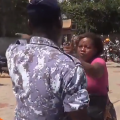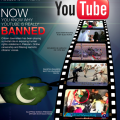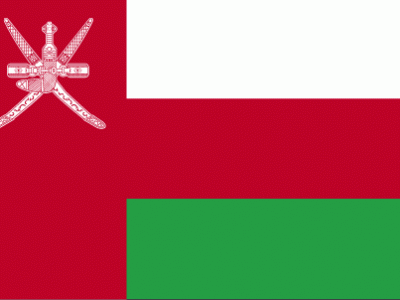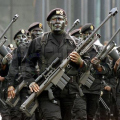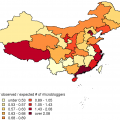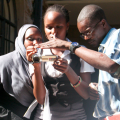Stories about Human Rights from March, 2013
Togo: Victory for Media Freedom, but Clashes Continue
This week, journalists in the West African nation of Togo celebrated the Constitutional Court's decision to throw out a recent law restricting media freedom. But with elections approaching, crackdowns on the press have continued, with some turning violent. This post features a series of citizen videos collected from YouTube and Twitter and curated on WITNESS' Human Rights Channel on YouTube.
On Eve of Elections, Advocates Challenge YouTube Blocking in Pakistan
With general elections fast approaching in Pakistan, advocates are urging the government to cease blocking sites like YouTube which have become vital platforms for the circulation of news and information. YouTube has been blocked in Pakistan nearly continuously since September 2012. In partnership with the Media Legal Defence Initiative, Pakistani NGO Bytes for All is challenging the blocking in court.
Oman: Online Activists Freed
On 21 March, the Sultan of Oman issued a pardon for online activists and writers convicted on charges of insulting the ruler, "information technology crimes" and taking part in unauthorized protests. The move, which came as a surprise to most observers, runs counter to increasing attacks against online freedom of expression in the region.
Digital Freedom: Principles and Concepts
The Egyptian Institute for Freedom of Thought and Expression recently issued its first statement on digital freedom, a simplified research paper to propose definitions for digital rights and related principles. This post offers a brief description of the paper, which focuses on universal access, freedom of opinion and expression, the right to privacy, and the right to creativity, development and innovation.
Mexico: Lethal Threats for Citizens Reporting on Drug Crimes
In Mexico last month, a drug cartel offered a bounty of MX$600,000 for information on the identity and location of a person who has been using social media to report on drug violence in the northern state of Tamaulipas. The drug war has had a stark, chilling effect on Mexico's press, with sometimes lethal violence against journalists forcing news outlets to censor their coverage of crime. But this and other recent incidents have shown that both professional and citizen journalists alike are now facing these threats.
New Study: Manipulating China's Most Influential Microbloggers
As China's largest online social forum and most popular micro-blogging platform, Sina Weibo is subject to heavy censorship and manipulation by government actors. Earlier this week, Global Voices Advocacy explored the implications of recent findings by a group of US-based computer scientists on Sina Weibo's filtering techniques. Today, we look a new study from a group of researchers at Hong Kong University, who worked to measure the influence of certain groups of micro-bloggers on the site.
China: Researchers Uncover Microblog Filtering Mechanisms
In a recent paper entitled "The Velocity of Censorship: High-Fidelity Detection of Microblog Post Deletions," a group of computer scientists describes their study of censorship practices on Sina Weibo, China's most popular microblogging service. Sina Weibo employs a large number of site moderators to monitor and, when necessary, stop the flow of dissenting ideas on the social media platform.
#FreeBassel: One Year Later, Syrian Netizen Remains in Prison
One year ago today, Syrian web developer and open technology advocate Bassel Khartabil was arrested and incarcerated in Damascus, where he has remained ever since. Known among open technology advocates as Bassel Safadi, the 31-year-old served as the Creative Commons lead for Syria. Global Voices Advocacy urges readers to support the campaign for his release by visiting the #freebassel website, tweeting about Bassel's case, or attending an event in his honor.
World Day Against Cyber Censorship
March 12 is World Day Against Cyber Censorship. Reporters Without Borders and other advocates for Internet rights are calling on activists, movements and organizations around the world to participate by reminding their constituents of the importance of protecting free expression online.
All Eyes on Kenya — and Cameras, too
In the months approaching Kenya's national elections, citizens across the country mobilized to support peace on election day. Among them are 120 human rights activists and citizen journalists who participated in WITNESS video trainings in February. Several participants recently shared their thoughts, outlining their hopes and fears for the election and explaining what motivated them to learn how to film.
US Soldier Sent WikiLeaks Documents to “Spark Debate” on War
Last week, US Army soldier and whistleblower Bradley Manning took the stand in a military hearing to explain, in his own words, why he leaked thousands of sensitive military documents to the website WikiLeaks. Manning told the court that he decided to leak these documents to the media because they left him deeply concerned about American military activities in the wars in Iraq and Afghanistan.
Location Matters: Online Defamation in Latin America
In Latin America, where defamation laws are not consistent, online defamation cases threaten to erode the universal right to freedom of expression, which is enshrined by nearly every national constitution in the region. Definitions of what constitutes a criminal defamation offense - and therefore its consequences - vary throughout the region. A critical comment online could lead to a fine in one country but a prison sentence in another.

